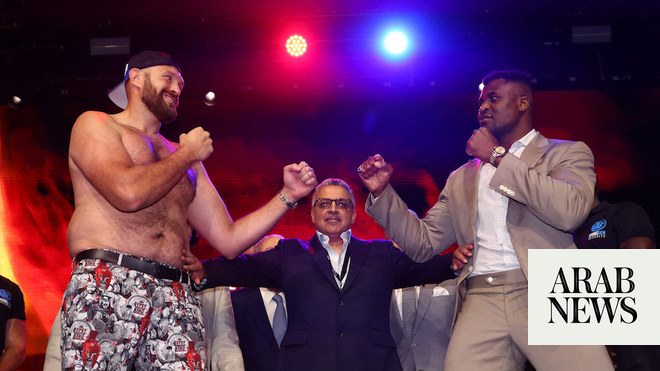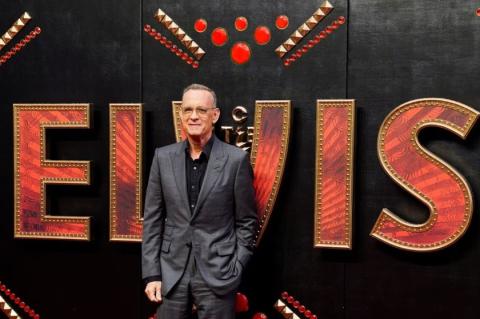
It’s all smiles in dressing room four in the bowels of the MGM Grand Garden Arena, where Tyson Fury is only days away from defending his WBC heavyweight title against Deontay Wilder. It’s a scene that would have been unthinkable a few years ago, when Fury’s career appeared over after he left the sport for more than two years amid public battles with addiction and mental illness.
“I’m not overconfident,” Fury says. “I’m not going in there thinking I’m just going to knock this guy out. I’ve prepared hard, I’ve prepared well. No injuries. So I’m giving Wilder the respect he needs and deserves for this fight.”
The Gypsy King is a hot favorite in Saturday’s big-ticket heavyweight showdown on merit. When they first crossed paths in December 2018 for the WBC title then held by Wilder, Fury spent most of the evening boxing the heavy-handed Alabaman’s ears off with erratic feints and deft upper-body movement belying his towering 6ft 9in frame. Even after suffering knockdowns in the ninth and 12th rounds, the latter of which left him seemingly unconscious on descent, Fury came off the floor each time and finished the round getting the better of the exchanges before settling for a split draw.
Fifteen months later, Fury delivered the definitive outcome their first encounter failed to produce with a masterclass of come-forward violence, dropping Wilder in the third and fifth rounds before pouring on the punishment until the champion’s corner threw in the towel in the seventh.
Interestingly, Saturday’s third instalment – which makes only the fifth trilogy between heavyweight champions in boxing history after Patterson-Johansson, Ali-Frazier, Ali-Norton and Bowe-Holyfield – will mark the first time the 33-year-old from Manchester has ever defended an actual belt despite a claim to the lineal title (ie being the man who beat the man who beat the man) that dates back nearly six years. Not that that detail has even occurred to the Gypsy King.
“Like I said early on in my career, I wasn’t interested in being the longest reigning champion on the most defences,” he says. “I’m not interested at all in that stuff. History to me means nothing. I don’t care about what goes down in history, what people will say about me and all that. How will you be remembered? Don’t care. Because I’ll be dead.”
Even if Fury is battered out of the park on Saturday night and never fights again, that he’s even in this position is a testament to an astonishing return from rock bottom, when he ballooned to nearly 25st and contemplated taking his own life during a 31-month layoff.
“It was internally, externally and spiritually: a combination of the three,” Fury says of his comeback from the abyss. “To go from the weight I was at, where I was at in my life, being 400lb, couldn’t sleep with the light off, scared to death of everything, anxiety killing me. I’ve come a long, long, long way. My anxiety was terrible. I believe anxiety is one of the worst things that anybody could have. It’s the fear of the unknown. It’s crazy.”
In the three years since Fury repurposed his first fight with Wilder into a platform to discuss his struggles with mental health, a subject once regarded as one of the last taboos in elite sport has since been thrust to the fore, most notably in the public ordeals of Naomi Osaka and Simone Biles this year. It’s a long-overdue conversation that Fury hasn’t necessarily gotten the proper credit for starting.
Osaka, who last month hinted at an extended break from tennis after her early exit from the US Open, has spoken about the ways her battles with anxiety can be directly traced back to her star-making win over Serena Williams for her first major title. Her recent admission that winning no longer gives her happiness resonates deeply with Fury, who experienced the same feelings of existential ennui in the aftermath of his own life-changing triumph in Düsseldorf six years ago, when he ended Wladimir Klitschko’s decade-long championship reign and won the WBA, WBO and IBF heavyweight titles he would later surrender without throwing a punch.
“Winning doesn’t mean anything,” Fury says. “It’s terrible. And I did retire. I was out for three years. I was as low as any man could ever go, to be fair. Right on the edge of death and life. What advice would I give for young athletes coming through – the best advice I could give anybody – is get the right help straight away. I never seeked help for my mental struggle until 2016. I didn’t know what was going on. I wasn’t experienced. Nobody knew around me what was going on. Very uneducated on the matter. And as soon as I got help, the sooner I could go back to get recovered.”
He continues: “One of the best things I ever did was come out and speak about it, because with communication you can get over any hurdle. But keeping it all to yourself and not communicating with others, you’re a bottle of champagne being shaken and shaken, waiting for the top to explode. And you’ll have a mental breakdown and won’t recover – or you seek help and try and get better.”
For Fury, that meant seeing a local psychologist where he was living in Lancaster, who helped him make sense of the extreme mood swings that were dominating his psyche. Staying well is a difficult thing to do and not many people have managed to do it for long stretches of time. Getting those demons in check has allowed Fury to take back control of his life and plot a return to the summit of his sport that seemed impossible only a few years ago, guided by the hard-won wisdom that with depression there are no final victories.
“I’m very experienced with it all and I sort of know what I’ve got to do when I get into those low moments,” Fury says. “I know it’s going to pass. But before, when you don’t know what to do and you’ve never experienced getting over it properly, it’s tough. Now I’ve got a mechanism of: I train every day and that keeps the depression away – the black dog, as Winston Churchill used to call it – keeping it at bay.
“It’s not something you can ever defeat. You can never, ever, ever win the battle of mental health because that black dog will always creep its way back into your life at some point. And it’s not if, it’s when.”
For now, Fury’s attention is squarely focused on the business at hand: closing the book on Wilder and, ultimately, unifying the long-fractured heavyweight championship for the first time in more than two decades. “Wilder could make all the improvements he wants,” he says. “I just don’t think he can beat me. I think he can beat a lot of other people, but I don’t think he can beat me. And if I did think he could beat me I would be in the wrong job.”












